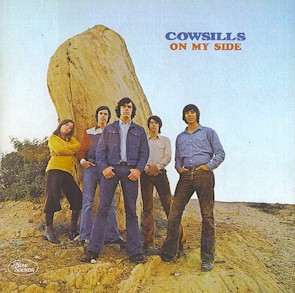
Front cover
|
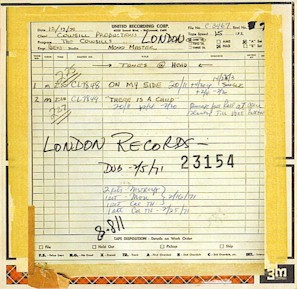
Behind the CD
|
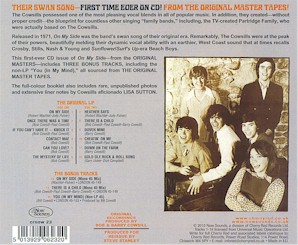
Back cover
|
Insert
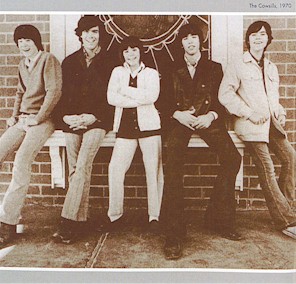
The Cowsills 1970
|
|
In the late 1960s, The Cowsills were widely regarded by their fans as the First Family of pop music. By the end of the decade, they'd delivered six albums featuring some of the sweetest, most harmonic music of the era and were about to see a fictional television family based on their story. With 15 singles (eight of them in Billboard's Hot 100) plus a never-ending tour schedule, Bill, Bob, Paul, John, Barry, Susan, and mother Barbara were flying high.
Not coincidentally, 1971 was one of the best years for families in music. The Jackson 5 was experiencing astronomical record sales, as were The Osmonds. The Carpenters received the award for Best New Group at the February Grammy® Awards that year, just as Sonny and Cher were experiencing a comeback on the nightclub circuit that led to a TV series that fall. Even The Partridge Family, The Cowsills' TV counterparts, were selling millions of records from their musical sitcom. Ironically, at the very same time, The Cowsills were getting ready to call it quits with their final album, On My Side.
|
|
By now, the Cowsills story is fairly well known. The group started with four of the Cowsill boys (Bill, Bob, Barry, and John) performing in clubs as teens and preteens. A few years and a lot of club dates later, the quartet got a couple of limited recording contracts, first with Johnny Nash's Joda label, and later with Mercury. The two contracts yielded a series of singles that received little notices - just enough to keep the band on the road to fame. They were soon picked up by MGM Records, with the enthusiastic backing of songwriter and producer Artie Kornfeld. In 1967, Kornfeld and writing partner Steve Duboff gave the four Cowsill boys a song called "The Rain, The Park & Other Things" to record. Their mother and little sister, Susan, were added to the mix, and the result was a million-seller. History was made and a family act was born.
The success of that first single was followed by an equally successful self-titled album and a follow-up LP and single, both titled We Can Fly, in 1968. Over the next two years, more hit singles followed (including "Indian Lake" and "Hair") as well as the albums Captain Sad And His Ship Of Fools, The Cowsills In Concert and a "Best Of" compilation. The 1960s were very good to The Cowsills.
The turn of the decade brought about a lot of change for the group. The first mixed blessing came with the offer of a television series. Columbia Pictures sent a team of writers to observe the family for several months in the late '60s, with the idea of creating a series around them. The studio liked what they saw, and a sitcom was created that was based on, rather than starred, the actual Cowsills family. Producer Bob Claver had already hired a group of professional musicians to create the show's music.
Being left out of the series was not all bad news for The Cowsills, as The Partridge Family helped keep The Cowsills in the press for the next year or so. It wasn't all good news, either, as Cowsills producer Wes Farrell and songwriter Tony Romeo moved over to the Partridge camp in mid-1970. Where that team had once produced some of The Cowsills' best ("Indian Lake," "We Can Fly," and "Poor Baby"), they were now creating hits for
|
|
The Partridge Family — most notably the fastest-selling song of dial year, "I Think I Love You." No one from The Cowsills' camp was jumping for joy that their story, sound, and look had provided the basis for the enormously popular Partridge Family, and that the same people who helped make 'The Cowsills' hits were now in direct competition with them.
The Partridge Family aren't entirely to blame for The Cowsills' decline. The group's material was becoming darker and more mature,
as with their 1969 single "The Prophecy Of Daniel And John The Divine" and the subsequent LP, II x II, released at the beginning of 1970. II x II contained a number of spiritually-themed songs reflecting The Cowsills' strong Catholic faith and religious upbringing. Interestingly, it also contained the Mom-centric Barry Mann and Cynthia Weil composition, "I Really Want To Know You," which The Partridge Family would cover on their debut album, released later that year.
Although their record sales were declining, The Cowsills were still making successful concert appearances, playing everywhere from state fairs to Las Vegas nightclubs. They were also still making television appearances, including their second appearance on the very cool Playboy After Dark and on The Tonight Show to promote II x II. They also turned up on The Mike Douglas Show and The Barbara McNair Show to support the album.
|
|
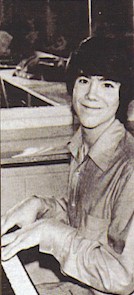
|
|
Meanwhile, despite The Cowsills' public image as a squeaky clean family unit, there was turmoil behind the scenes. As a performance group, they all worked hard and remained professional, but there was as much strife as there was fun. Father (and former Navy man) Bud Cowsill still ran a tight ship and, although he gained a reputation behind the scenes, fans remained unaware of any family discord. "The Cowsills were presented to 16 readers as their shiny, happy images indicated," wrote former 16 magazine editors Randi Reisfeld and Danny Fields in their 1997 book "Who's Your Fave Rave?". "If the magazine had suspicions otherwise, we didn't pursue them. We could see that dad Bud Cowsill ruled the roost...even among the generally pushy lot of stage parents, he was known as a troublemaker." Bud himself confessed in a 1990 interview that he may have been responsible for a lot of stress behind the scenes, telling interviewers Steven Dougherty and Stanley Young. "I didn't know how to raise kids. I'm a harsh taskmaster... I wouldn't want me for a father."
|
|
The Cowsills 1969
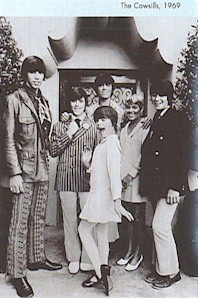
|
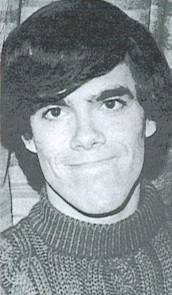
|
|
Bud was also the one who controlled the family's finances and ultimately decided which of the family members could and couldn't perform in the group. The biggest impact Bud's control had on the group came after Bud caught eldest brother Bill smoking marijuana and kicked him out of the band. Bill fielded an offer to replace the recently retired Brian Wilson in The Beach Boys, and began to work on his solo career, which yielded an album titled Nervous Breakthrough. "That was the beginning of the end of The Cowsills right there," said the band's newly appointed leader, Bob, in Steve Dougherty's 1990 article about the band.
With Bill out, the rest of the family pulled together to record their final original LP, On My Side. After II x II, the band was let go from MGM and signed a new contract with London Records. Bob took over Bill's producing chores on On My Side along with younger brother Barry; otherwise, the band's line-up was the same. The album cover suggested something different, however: Bob, Barry, John, Paul, Susan, and mother Barbara all sang on the album, though Mom was not pictured on the front cover, which showed the band standing in front of a big rock off Malibu Canyon Road in Los Angeles.
|
|
Bob, Barry, and Paul, in some combination, provided the songwriting for nine of the 12 songs on the album. Bob contributed three solo compositions ("Contact Mae," "Can You Love?," and "The Mystery Of Life") and three with Paul ("Once There Was A Time," "If You Can't Have It-Knock It," and "Cheatin' On Me"); Barry wrote two on his own ("Dover Mine" and "Down On The Farm") while the three collaborated on one ("There Is A Child"), which showcased Barbara's lead vocal. Although Bob had been writing great material with Bill from the beginning, he recently commented on the band's website (www.Cowsill.com) that "the On My Side album for London sounds good, but I was still learning how to write a song, and these particular songs sound like they're out of Songwriting 101 to me. I still had a ways to go in that arena."
The first single released from the album was the tide track, written by longtime Cowsills friend and guitarist Waddy Wachtel and singer/songwriter Judi Pulver, who had previously collaborated with Bill and Bob on two tracks from II x II. It was a strong offering with a strong lead vocal from John, but the single only managed to "bubble under" on the Billboard charts, peaking at #108. The pair also collaborated on the haunting "Heather Says," often cited as a fan favorite and with a terrific lead vocal from 12-year-old Susan.
Despite a solid offering of pop tunes, On My Side barely made a dent on the national
charts, making a meager showing on Billboard's LP roster at #200 in May of 1971.
Although their sound was maturing, the band's fans were as well, and were
moving on to other favorites, as evidenced by The Cowsills' rapidly waning coverage
in teen magazines. It seemed as though they had been replaced entirely by the
Partridge Family, who, having just released their second blockbuster album,
had made off with the younger audience that had formerly comprised The
Cowsills' following.
|
|
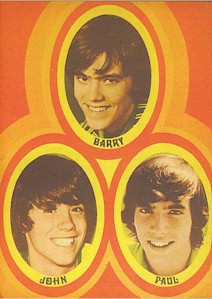
|
|
The band was working on a follow-up album for London when the label dropped them after On My Side tanked. A couple singles emerged from these sessions: "You (In My Mind)," backed with a pop gem called "Crystal Claps" (penned by Wachtel) followed by the raucous "Covered Wagon" (backed with "Blue Road"), which brought Bill back into the fold after Susan, Paul, and Mom decided to retire m 1972. " 'Covered Wagon' was my favorite single by us," Bob recently wrote on Cowsill.com. "The song was recorded by Bill, me, Barry, and John, the original four that started it ...and it represented to us a chance to show people the direction we would have gone gad it not been altered with Mom and Susan coming in at the time they did."
The Cowsills had toured actively through 1971, but worked less in 1972 as family strife took its toll. Finally, the group called it quits. "We stayed together way beyond the natural point of moms and dads and boys and girls staying in the same house." Susan said of the break-up on a 1990 episode of The Joan Rivers Show. "It got too small." "It's really hard working together, touring together, and living together," John said during the same interview.
Each family member went their own way, though it was by no means the end of The Cowsills. Although officially disbanded, most of the group performed at a reunion show in 1975 in Tampa, Florida. A year earlier, John, Paul, and Waddy, calling themselves Bridey Murphy, had released a single on Capitol Records called "The Time Has Come" a reworking of Waddy's "Crystal Claps" that was backed with a new tune titled "Be Your Mother's Son." Around the time of the Tampa show. The Cowsills officially filed for bankruptcy, thanks to Bud's mishandling of the band's funds. "When we broke up, we went from literally having it all, to having nothing," Bob told journalist Gary James in 1990. "Bankruptcy and all that goes along with that. The horrible Hollywod story. And then, the business kind of messed up our family a bit and splintered it very much so." Sadly, the next time the family would reunite as a whole would be at mother Barbara's funeral in 1985.
|
|
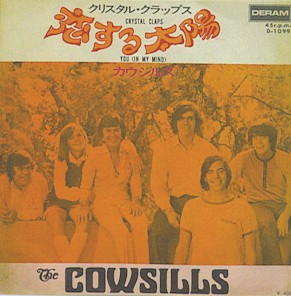
|
|
While most Of The Cowsills remained in the music business in one form or another. Susan, Paul, John, and Bob began playing gigs around Los Angeles, using aliases like The Secrets and The Critics. The four began work on an album of new material with producer Chuck Plotkin (best known as engineer on Brucc Springsteen and Bob Dylan LPs) in 1978; known as the Cocaine Drain session, the recordings were shelved for 30 years, and finally released by The Cowsills on their own label in 2008, along with other previously unreleased material from that time. The band had already issued a 1999 reunion album, Global, which contains some of the group's best material.
|
The Cowsills experienced the highest highs of being teen stars in a unique time in pop music history. And while their road was as rough as it was blissful, time has proven the band's legacy to be a solid one. The group officially announced its return to performing in 1990 and, although both Bill and Barry have passed away in recent years, the band continues to perform, tour, and sing together. While their classic era may have officially ended in 1972 with On My Side, The Cowsills have — fortunately for us — never stopped making music.
|
|
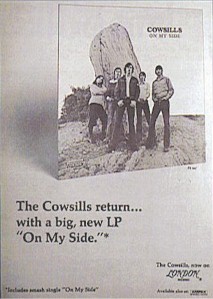
|
|
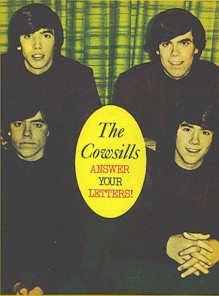
|
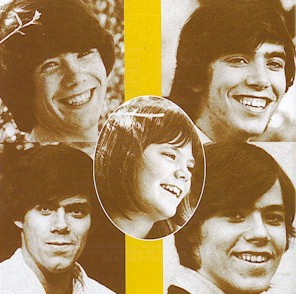
|
|
|
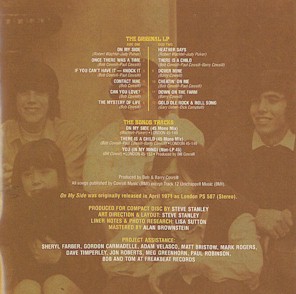
|
|
THE ORIGINAL LP
|
SIDE ONE
ON MY SIDE 1
(Robert Watchel - Judi Pulver)
ONCE THERE WAS A TIME 2
(Bob Cowsill - Paul Cowsill)
IF YOU CAN'T HAVE IT - KNOCK IT 3
(Bob Cowsill - Paul Cowsill)
CONTACT MAE 4
(Bob Cowsill)
CAN YOU LOVE? 5
(Bob Cowsill)
THE MYSTERY OF LIFE 6
(Bob Cowsill)
|
|
SIDE TWO
7 HEATHER SAYS
(Robert Watchel - Judi Pulver)
8 THERE IS A CHILD
(Bob Cowsill - Paul Cowsill - Barry Cowsill)
9 DOVER MINE
(Barry Cowsill)
10 CHEATIN' ON ME
(Bob Cowsill - Paul Cowsill)
11 DOWN ON THE FARM
(Barry Cowsill)
12 GOOD OLE ROCK & ROLL SONG
(Gary Usher - Dick Campbell)
|
THE BONUS TRACKS
13 ON MY SIDE (45 Mono Mix)
(Watchel-Pulver) LONDON 45-149
14 THERE IS A CHILD (45 Mono Mix)
(Bob Cowsill - Paul Cowsill - Barry Cowsill) LONDON 45-149
15 YOU ON MY MIND (Non-LP 45)
(Bill Cowsill) LONDON 45-153 Produced by Bill Cowsill
Produced by Bob & Barry Cowsill
All songs published by Cowsill Music (BMI) except Track 12 Unichappell Music (BMI).
On My Side was originally released in April 1971 as London PS 587 (stereo).
PRODUCED FOR COMPACT DISC BY STEVE STANLEY
ART DIRECTION & LAYOUT: STEVE STANLEY
LINER NOTES & PHOTO RESEARCH: LISA SUTTON
MASTERED BY ALAN BROWNSTEIN
PROJECT ASSISTANCE:
SHERYL FARBER, GORDON CARMADELLE, ADAM VELASCO, MATT BRISTOW, MARK ROGERS,
DAVE TIMPERLEY, JON ROBERTS, MEG GREENHORN, PAUL ROBINSON,
BOB AND TOM AT FREAKBEAT RECORDS
|
|
Side One
ON MY SIDE ................................3:05
(Watchel & Pulver)
Lead Vocal: John
ONCE THERE WAS A TIME ...............3:32
(Bob & Paul Cowsill)
Lead Vocal: Paul & John
IF YOU CAN'T HAVE IT - KNOCK IT .....2:40
(Bob & Paul Cowsill)
Lead Vocal: Bob
CONTACT MAE .............................3:10
(Bob Cowsill)
Lead Vocal: Bob
CAN YOU LOVE? ...........................3:22
(Bob Cowsill)
Lead Vocal: Paul
THE MYSTERY OF LIFE ....................3:55
(Bob Cowsill)
Lead Vocal: Bob
Side Two
HEATHER SAYS ............................. 3:01
(Watchel & Pulver)
Lead Vocal: Susan
THERE IS A CHILD .......................... 2:28
(Bob, Paul, & Barry Cowsill)
Lead Vocal: Barbara
DOVER MINE ................................ 1:50
(Barry Cowsill)
Lead Vocal: Barry
CHEATIN' ON ME ........................... 3:25
(Bob & Paul Cowsill)
Lead Vocal: John
DOWN ON THE FARM ...................... 1:59
(Barry Cowsill)
Lead Vocal: Barry
*GOOD OLE ROCK & ROLL SONG ......... 2:17
(Usher & Campbell)
Lead Vocal: Barry
COWSILL MUSIC (BMI)
*DUNBAR MUSIC, INC. (BMI)
PRODUCED BY BOB & BARRY COWSILL
ENGINEER: Ben Jordan at United Recording Studio
ARRANGED BY THE COWSILLS
REPRESENTATION:
MC MANAGEMENT
Photography: Ed Casaeff
Album Design: Wayne Kimbell / Richard Edlund
COWSILL FAN CLUB
P. O. Box 69420
Los Angeles, California
90069
LONDON RECORDS, INC
539 WEST 25TH STREET, N.Y.C., N.Y 10001
LINER: PS 587
|
|
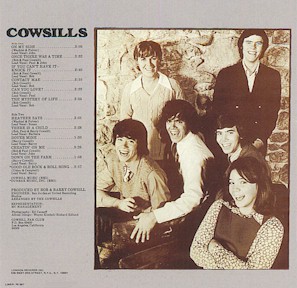
|
|













